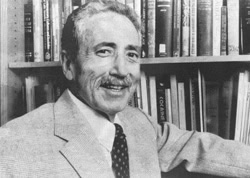
Joseph Gagliano
Joseph Gagliano, professor emeritus of history at Loyola University Chicago died on July 16, 2011 in Evanston Hospital, Evanston, Illinois. Gagliano taught at Loyola from 1962 until his retirement in 1997, and beyond. Well regarded as a teacher and scholar, he held significant administrative positions in the university. For an unprecedented nine years, from 1986 to 1995, he chaired the history department.
Joseph Gagliano was born on April 15, 1930, in Milwaukee, Wisconsin, and he always remained proud of his Sicilian heritage. After an education in public schools, he attended Marquette University, where he graduated in 1954 with a BS in history. He remained at Marquette and received an MA in history in 1957. He then left for Georgetown University in Washington, D.C., where he concentrated on Latin American history, his first love. Georgetown awarded him the PhD in 1961 for his dissertation “A Social History of Coca in Peru.” That same year he married Gloria Borman, and they had two sons, Peter and Christopher. His beloved Gloria died in 1997.
Loyola University Chicago offered him a position as an assistant professor in 1962 after he had taught as an instructor and then assistant professor for three years at Aquinas College in Grand Rapids, Michigan. In Chicago Joe hit the ground running. Students gave him high ratings as a teacher even though he proved to be demanding. In those days young professors at Loyola often taught four courses a semester, and so did Joe. His course load included the survey courses in Western Civilization, sometimes enrolling over one hundred students, as well as courses in Latin American history. Among students and colleagues alike, he was renowned for his dry wit and deadpan delivery, both of which he deployed later as a dean and department chair. At the same time he published articles in Spanish as well as in English periodicals, contributed to reference works, and presented papers usually on topics relating to the commerce in coca in Peru and the situation of the Catholic Church in Latin America. Among these were “The Coca Debate in Colonial Peru” published in The Americas in 1963.
In 1976 Joe moved into administration, taking a position as assistant dean of the graduate school and in 1978 became associate dean, a position that he held until 1986. During this period he obtained for the graduate school grants totaling $200,000 from the Graduate and Professional Opportunities Program of the U.S. Department of Education, to foster the advancement of these groups at Loyola. All the while he continued to teach in the history department on a part-time basis.
Joe’s career reached its peak with his appointment as chair of the history department in 1986, a position in which he excelled. He was fair, efficient, and innovative. He was a stickler for developing and following proper procedures, an attitude that saved the department and the university from many difficulties. Like a scout for a major league baseball team, he had an astute eye for talent and potential, and he oversaw the appointment of a number of outstanding junior professors who remained at Loyola and greatly enhanced the stature of the department in the following years. Not only did he hire them, but he effectively mentored their research and encouraged their teaching as he guided them toward tenure. In 1990 he introduced a formal three-year review policy for untenured faculty, and he supported the successful campaign to convince the university to provide a semester sabbatical for junior faculty in their third year at Loyola.
Despite ill health during the later years of his chairing the department, Joe published in 1994Coca Prohibition in Peru: The Historical Debates (Univ. of Arizona Press), a significant volume coming as it did at a time when increasing attention was being given to the cultivation and use of drugs in Peru and neighboring countries. Three years later he published Jesuit Encounters in the New World: Jesuit Chroniclers, Geographers, Educators, and Missionaries in the Americas, 1549–1767 (Rome, Jesuit Historical Institute), a volume edited with Charles E. Ronan. This volume contained the papers delivered at a three-day symposium commemorating the quincentenary of the arrival of Columbus in America held at Loyola University October 8–10, 1992, and supported by a significant grant from the National Endowment for the Humanities. During the 1990s Joe was also regularly recognized by graduating seniors as a highly influential teacher. After the conclusion of his term as chair of the history department, the university called upon him to exercise his administrative skills as interim chair of the department of classical studies. In 1996 his faculty colleagues honored him as Faculty Member of the Year.
After his retirement Joe continued to teach in the senior professors program, and from 1998 to 2000 he returned to the university to serve as interim director of the Latin American studies program. He maintained an active interest in the department and the university and regularly turned up at their events until his health would no longer allow him to do so. He is missed. A Memorial Mass was celebrated for him in Loyola’s Madonna della Strada Chapel on July 21, 2011. R.I.P.
Robert Bireley, SJ
Loyola University Chicago